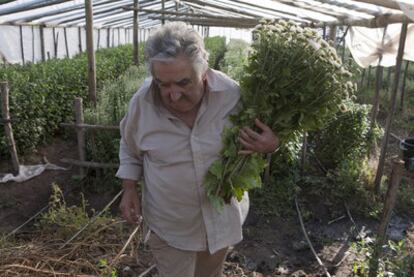Uruguay may repeal military amnesty
Mujica's coalition wants to go against referendums and reverse 1986 law
President José Mujica's government may find itself engulfed in an institutional crisis after members of his ruling coalition said they will go against their leader's wishes and on Thursday repeal a 1986 law that gives amnesty to Uruguay's former military leaders for human-rights crimes.
Mujica - a former guerrilla who fought the military-backed governments during the 1970s and spent years in jail - says the law should not be annulled because it was backed by a popular vote in two referendums, held in 1989 and 2009. Even though he says he cannot forget the excesses committed by the military dictatorships, he prefers to look ahead. However, parties that make up Mujica's Broad Front coalition say that the law must be repealed, and those responsible for the forced disappearances, murders and other human rights abuses should be put on trial.
An estimated 200 Uruguayans were kidnapped and disappeared during the brutal 1973-1985 military dictatorship.
The Inter American Human Rights Court has asked the Uruguayan government to investigate the disappearances.
After nearly six hours of debates on Saturday, the majority of the members of the Broad Front coalition in a plenary agreed to vote in favor of scrapping the law. It also approved setting up a committee to begin studying the possibility of holding another referendum on the issue. The Senate has already voted in favor of annulment but the decision must be taken by the lower chamber.
The coalition is divided, however. Vice President Danilo Astori and former President Tabaré Vázquez have asked the group not to go against Mujica's wishes, warning that it could bring on serious institutional consequences because they will be ignoring the people's vote in the two referendums.
Opposition Senator Pedro Bordaberry, a member of the Colorado Party, said that after Thursday's vote in Congress Uruguayans are going to conclude "that the Front doesn't respect the basic rules of democracy."
"It seems that the plenary values more what the radicals and the Communist Party says than what Mujica, Vice President Astori and Tabaré Vázquez have asked," he told the Montevideo daily El País on Monday.
On Thursday, the Uruguayan Supreme Court also ruled that killings that occurred during the dictatorship should be classified as murders and not human-rights crimes. The decision provoked sharp reactions from human-rights groups that have been working with lawmakers to get the 1986 law revoked.

Tu suscripción se está usando en otro dispositivo
¿Quieres añadir otro usuario a tu suscripción?
Si continúas leyendo en este dispositivo, no se podrá leer en el otro.
FlechaTu suscripción se está usando en otro dispositivo y solo puedes acceder a EL PAÍS desde un dispositivo a la vez.
Si quieres compartir tu cuenta, cambia tu suscripción a la modalidad Premium, así podrás añadir otro usuario. Cada uno accederá con su propia cuenta de email, lo que os permitirá personalizar vuestra experiencia en EL PAÍS.
¿Tienes una suscripción de empresa? Accede aquí para contratar más cuentas.
En el caso de no saber quién está usando tu cuenta, te recomendamos cambiar tu contraseña aquí.
Si decides continuar compartiendo tu cuenta, este mensaje se mostrará en tu dispositivo y en el de la otra persona que está usando tu cuenta de forma indefinida, afectando a tu experiencia de lectura. Puedes consultar aquí los términos y condiciones de la suscripción digital.








































